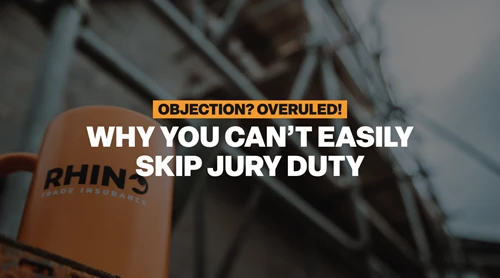Are you considering a career in plumbing? If so, you're making a wise choice. The plumbing industry offers a stable, rewarding career with outstanding earning potential and opportunities for growth.
In this blog post, we'll guide you through five steps to becoming a plumber, discuss what a typical day looks like, explore the benefits and earnings potential, and provide information on the necessary training. We'll also cover the importance of trade insurance and why Rhino Trade Insurance is the best choice for plumbers.
Step 1: Understanding the Role of a Plumber
Before diving into the steps to become a plumber, it's crucial to understand what the job entails. Plumbers install, fix, and maintain piping systems in homes, businesses, and industrial facilities. These systems include water, gas, and drainage pipes. Plumbers also work on appliances connected to these systems, such as dishwashers, water heaters, and washing machines.
A typical day might involve diagnosing and fixing a leak, installing new pipework, or ensuring a newly built home has a fully functional plumbing system. The job requires problem-solving skills, physical stamina, and the ability to work independently or as part of a team.
Step 2: Completing the Necessary Training
To become a qualified plumber in the UK, you need to complete specific training and gain relevant qualifications. Here's a breakdown of the common pathways:
Apprenticeships
One of the most popular routes is via an apprenticeship, which mixes on-the-job training with classroom-based learning. Apprenticeships typically last between two to four years and result in a Level 2 or Level 3 Diploma in Plumbing and Heating. You'll work under the guidance of experienced plumbers, gaining hands-on experience while earning a wage.
College Courses
Alternatively, you can enrol in a vocational course at a local college or training centre. These courses offer more flexibility and can be completed full-time or part-time. A City & Guilds or BPEC (British Plumbing Employers Council) qualification is highly regarded in the industry.
NVQ Assessments
For those who have already gained some plumbing experience, an NVQ (National Vocational Qualification) assessment allows you to demonstrate your skills and knowledge on the job. This route is ideal if you have been working as a plumber's mate or in a related field.
Step 3: Gaining Work Experience
Work experience is crucial in plumbing. Not only does it enhance your skills, but it also makes you more attractive to potential employers. During your training, take every opportunity to work on real-world projects. This experience will help you build a portfolio of completed jobs, showcasing your abilities to future clients or employers.
Consider volunteering for community projects or seeking internships. Even unpaid work can provide valuable experience and references. Networking with experienced plumbers can also open doors to job opportunities and mentorship.
Step 4: Getting Certified and Regulated
Once you've completed your training and gained sufficient work experience, the next step is to get certified. In the UK, it's important to have the right certifications to legally and safely perform plumbing work.
Gas Safe Registration
If you plan to work with gas appliances and systems, you must be Gas Safe registered. The Gas Safe Register (GSR) is the official body of gas engineers qualified to work legally on gas appliances. To become registered, you need to pass an assessment and prove your competence in working with gas.
Step 5: Setting Up Your Business or Finding Employment
With your qualifications and certifications in hand, you can either seek employment with an established plumbing company or set up your own business. Each option has its pros and cons.
Employment
Working for a plumbing company provides job security, a steady income, and opportunities for further training and advancement. Many companies offer benefits such as paid holidays, pensions, and insurance.
Self-Employment
Starting your own plumbing business offers greater flexibility and the potential for higher earnings. However, it also comes with risks and responsibilities, such as managing your finances, marketing your services, and obtaining necessary trade insurance.
The Benefits of Becoming a Plumber
Plumbing is a highly rewarding career with numerous benefits like:
Job Security: Plumbing is a service we need, and skilled plumbers are always in demand. This demand provides excellent job security, even during economic downturns.
Good Earnings: Plumbers in the UK can earn a competitive wage. Entry-level plumbers can expect to earn around £18,000 to £25,000 per year, while experienced plumbers can earn £30,000 to £40,000 or more. Self-employed plumbers can potentially earn even higher incomes, depending on the number of clients and the complexity of the jobs they take on.
Job Satisfaction: Plumbing can be a highly satisfying career. You'll solve problems, help people maintain comfortable homes, and see the tangible results of your work. Every day brings new challenges and the chance to develop your skills further.
FAQs on Becoming a Plumber
How long does it take to become a qualified plumber?
The time it takes to become a qualified plumber depends on the training route you choose. Apprenticeships typically take two to four years, while full-time vocational courses can be completed in one to two years. Gaining additional certifications, such as Gas Safe registration, may require more time.
What skills are important for a plumber?
Key skills for plumbers include problem-solving, manual dexterity, physical fitness, customer service, and the ability to work independently or as part of a team. Good communication skills are also essential for explaining issues and solutions to clients.
Can I become a plumber if I don't have good GCSEs?
Yes, while good GCSEs in subjects like Maths, English, and Science can be beneficial, many training providers and employers focus more on practical skills and experience. You may need to pass an assessment to demonstrate your aptitude for plumbing.
What are the working hours like for a plumber?
Plumbers often work standard hours, but the job can require flexibility. You might need to work evenings or weekends or be on call for emergency repairs. Self-employed plumbers can set their own schedules but must be available to meet client needs.
Trade Insurance for Plumbers
Trade insurance is crucial for protecting your plumbing business against potential risks and liabilities. As a plumber, you might face various challenges, including accidental damage to property, injuries, or legal disputes. Here are the key types of insurance you should consider:
Public Liability Insurance: Public liability insurance is a protection if a member of the public is injured or their property accidently damaged due to your work. This is essential for protecting yourself against costly claims and legal fees.
Employers' Liability Insurance: If you employ staff, you are legally required to have employers' liability insurance. This covers you if an employee is injured or becomes ill due to their work.
Professional Indemnity Insurance: Professional indemnity insurance covers you if a client claims you provided inadequate advice, services, or designs that caused them to suffer a financial loss.
Tool Insurance: Your tools are invaluable and truly essential to your plumbing work, and tool insurance ensures they are covered against theft, loss, or damage.
Start Your Plumbing Journey & Get Covered
Becoming a plumber is a fulfilling and lucrative career choice. By following the five steps outlined in this guide, you'll be well on your way to success in the plumbing industry.
Remember, having the right insurance is crucial for protecting your business and providing peace of mind. Give Rhino Trade Insurance a bell on 0116 243 7904 for all of your insurance needs today.




